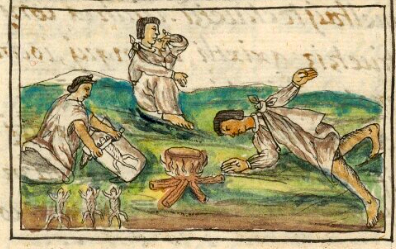cuetzpalin (FCbk10f113v)
This iconographic example, featuring the lizard (cuetzpalin), is included in this digital collection for the purpose of making comparisons with related hieroglyphs. The term selected for this example comes from the keywords chosen by the team behind the Digital Florentine Codex. There is no gloss. This example shows one lizard on a grinding stone (metlatl) and three more on the ground nearby. According to the DFC title for this scene, the woman is in the process of grinding the cuetzpalin using her hand-held grinding stone (metlapilli) on the larger stone to add to urine and provide the mixture as medicine to someone who has had a fall. The contextualizing image shows a man who has fallen and another who is drinking from a bowl (caxitl). The bowl includes a hieroglyph of water (atl, which could also mean urine) going toward his mouth. The woman wears a white cotton huipilli and skirt (cueitl), and these garments have some added lines and brown shading that gives them a three-dimensionality (showing the impact of European artistic methods on the Nahua tlacuilo). This is true, too, of the added landscaping.
Stephanie Wood
Because the cuetzpalin was a day sign in the calendar, and therefore it became a personal name (shortened to Cuetzpal), it is not difficult to find Nahuatl hieroglyphs of the lizard. Karttunen notes that this could also be an iguana.
Stephanie Wood
1577
Jeff Haskett-Wood
lizard, lizards, lagartijas, nombre de día, medicina, salud
cuetzpal(in), a lizard, https://nahuatl.wired-humanities.org/content/cuetzpalin
la lagartija
Stephanie Wood
Available at Digital Florentine Codex/Códice Florentino Digital, edited by Kim N. Richter and Alicia Maria Houtrouw, "Book 10: The People", fol. 113v, Getty Research Institute, 2023. https://florentinecodex.getty.edu/en/book/10/folio/113v/images/0 Accessed 30 September 2025.
Images of the digitized Florentine Codex are made available under the following Creative Commons license: CC BY-NC-ND (Attribution-NonCommercial-NoDerivs 4.0 International). For print-publication quality photos, please contact the Biblioteca Medicea Laurenziana ([email protected]). The Library of Congress has also published this manuscript, using the images of the World Digital Library copy. “The Library of Congress is unaware of any copyright or other restrictions in the World Digital Library Collection. Absent any such restrictions, these materials are free to use and reuse.”




